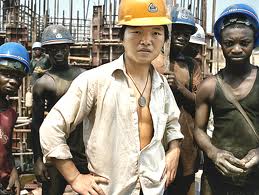This story is part of a series of narratives on the benefits of Foreign Direct Investment and Globalization to the Virgin Islands. It looks at how FDI is pulling Africa out of poverty. Africa, once the laughing stock of the world, in terms of social and economic development, is today providing valuable lessons for developing economies.
Now, a few words, before embarking on a continuing series of stories on the fact of globalization and its effects, whether beneficial or not, on Virgin Islands community. The preamble alludes to a response to an anti globalization commentator in these Lesser Antilles. The response was from an anonymous reader to a story in Virgin Islands News Online of November 29, 2012, a story titled, ‘’ COMMENTATORS CLASH ON GLOBALIZATION IN THE VIRGIN ISLANDS.
The responder very intelligently and correctly asserted that without trust companies, a major component of BVI commerce, this community would never have so many families able to send their kids to college, build their own homes, live comfortably, and receiving money for renting shell buildings and apartments to these same businesses owned by expatriates.
This is true. The BVI is clearly a beneficiary of globalization. And it is indeed paradoxical, even hypocritical, that some of these anti global soundings appear to come from those whose bread and butter clearly depends upon the health of a Virgin Islands economy that is critically affected by globalization, and free and international trade.
The ‘pro protectionist, aggressively nationalistic sounding commentator, ’ a man with a clear political agenda that appears mainly to consist of a classic divide and rule, blame the foreigner and outsider for all the evils in society song and dance.
And a pointer to a key and growing element in the up and coming General Election dogfight in three years. If this Commentator is considering, ‘throwing his hat into the ring,’ and ‘running for office,’ so to speak, he will certainly not be receiving this voter’s X, and one suspects a majority of crucial voters with a ‘foreign connection.’ And that goes for the rest of that Commentator’s ilk, politically speaking.
These are persons who believe jingoism, and the use of foreigners as political fodder is good politics. The controversial TV Show Host stated that, ‘’ Virgin Islanders should not have to embrace someone else’s money and idea, when it comes to the building of an airport or cruise ship dock to move forward.’’ That is clearly absurd. And it is an assertion that goes against the fact, even grain, of modern economics and international trade, and the free flow of financial and human capital between countries, and across national boundaries. The BVI, whether one may accept this or not has been built upon financial services and tourism: two industries driven by globalization and foreign trade.
Would the BVI survive in its present form without modern globalization? Certainly not: if anything, the BVI is much more dependent upon tourism, and international finance and trade, another word for globalization, than many countries in the Caribbean region. Some of these nations such as Jamaica, Trinidad and Tobago, and Guyana possess natural resources over and above their tourism product.
Caribbean leaders worth their pay all concede today that the region’s future and prosperity depends upon the state of the world economy and how effectively the Caribbean integrates with a 21st Century global economics driven by advanced science, information, and technology.
On the other hand, the benefits of Foreign Direct Investment, FDI, to national economies are obvious, when one takes a look at modern Africa. Globalization is pulling Africa out of decades of inescapable entrapment, deep in the swamp of underdevelopment, poverty, and squalor. The increased access to technology, computer and information science, telecommunications, and the flow of financial and commercial capital across borders, known as globalization, is offering the Dark Continent the chance to exit the mire of stagnation and underdevelopment, and get its house in order.
The Economist of December 3, 2011, described how, ‘’ Africa has a fast growing middle class;’’ and according to the World Bank, 60 million Africans, are in that critical economic and social grouping. Middle class is defined in price parity ratios, PPP, that assess quality of life and living standards of millions of consumers by building homogeneity into a global model that represents a variety of geographies from all the major landmasses. In essence PPP determines what the middle class represents by adopting a uniform model that builds in quality of life and standard of living metrics from differing international constituencies: a model that takes into account the unique variables in specific countries.
And according to the model, Africa’s middle class is, ‘’projected to reach 100 million in 2012:’’ a growing and definite positive. Another positive trend is this: for Africa, ‘’the rate of foreign investment has soared around tenfold in the past decade.’’ This is a huge indication of growing investor confidence in African commercial metrics.
Now, a model of invention and resourcefulness tells the story about how the access to technology globalization proffers, helps the budding entrepreneur. And a British Broadcasting Corporation’s News Network highlight, of July 20, 2012, fit just that bill. This was a narrative headed, ‘’ NIGERIA’S LOW COST TABLET COMPUTER.
It told of one Mr. Saheed Adepoju, a young African, ‘’ the inventor of INYE, a tablet computer designed for the African market.’’ According to the article, the machine’s selling point is its price: $350, as opposed to $700 for an IPAD. This product runs on the Google Android Operating System, and is described as, ‘’ an 8 inch device, halfway between a laptop and a mobile phone.’’ The hardware for this device was wholly made on the African Continent. Interestingly enough, this is a pointer to Africa’s growing industrial and technological potential.
In a related vein, Fareed Zakaria of GPS CNN, on his programme aired on September 2, 2012, described how China gets half its imports of commodities such as copper, iron ore, and oil, from Africa. Furthermore, six of the fastest growing countries in the world economically, can be found on the African continent.
Growth in the numbers of people living a decent life in Africa, and able to afford life’s basics, and then some, such as foreign travel, electronic goods and home appliances, personal transportation, education for the children, and healthcare, is a crucial feature of the world’s emerging economies. A growing middleclass is a critical marker of a developing country’s social and economic potential and development.
Another interesting fact about Africa is the growing commercial and economic alliance with new powers: ‘’ China’s arrival has improved Africa’s infrastructure, and boosted its manufacturing sector.’’
One caveat here: China’s overseas investments and arrival come with a price, with strings attached. Trade with China can bring about consequences that are not so good, like loads of Chinese descending on a country to work on Chinese financed projects, creating social angst. Still, trade between China and Africa reached 166 billion dollars in 2011, a twenty fold increase since 2001, and there are more than 2000 Chinese companies investing in Africa to date.
Emerging powerhouses, from Brazil and Turkey, to Malaysia and India, are following China’s lead. Africa could break into the global market for light manufacturing and services,’’ in due course. Africa is expected to become a major player in the global economy in coming years. Cross border commerce, long suppressed by political rivalry, is growing, as tariffs fall, and barriers to trade are dismantled.’’
Then, ‘’Africa’s enthusiasm for technology is boosting growth. It has more than 600 million mobile phone users: more than America or Europe. Since roads are generally dreadful, advances in communications, with mobile banking and telephonic agro-info, have been a huge boon. Around a tenth of Africa’s land mass is covered by mobile internet services, a higher proportion than India. ‘’
The Economist describes how,‘’ the health of many millions of Africans has also improved, thanks in part to the wider distribution of mosquito nets, and the gradual easing of the ravages of HIV/AIDS. Skills are improving: productivity is growing by nearly 3% a year, compared with 2.3% in America.’’ Africa’s falling mortality is boosting population growth and this is feeding economic growth directly, and in a positive manner for the first time.
Globalization is proving to be very good indeed, especially for the African Continent!
To be continued






